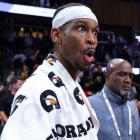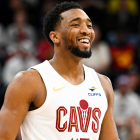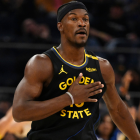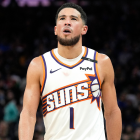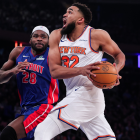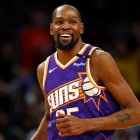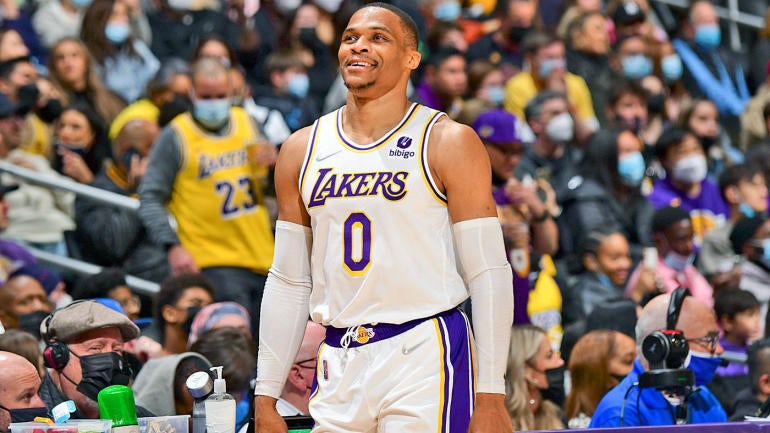
The Los Angeles Lakers managed to squeak out a 108-103 victory over the Minnesota Timberwolves on Sunday, but they needed to overcome a very uneven performance from Russell Westbrook to do so. The enigmatic point guard turned the ball over seven times in the first half alone and finished with more turnovers (nine) than made shots (seven). Westbrook finished with a strong fourth quarter, but his uneven night nearly prevented the Lakers from making it back to .500.
But when Westbrook was asked about his early struggles, he shook off the notion by suggesting that his negative plays were merely part of the game.
"I disagree with the point that the game wasn't going my way. My game is not predicated on shots or if I turn the ball over," Westbrook said after the win. "I missed some shots, that's part of the game. I'm allowed to miss shots. I can do that, like any other player. I can do that. I can turn the ball over too. I can do that. That's all a part of the game. But when you watch a basketball game and figure out what impact is, making the right plays, boxing out, rebounding, whatever that may be, making the right play, making the right reads. That's all about being a basketball player. "
There's a grain of truth in what Westbrook said. Nobody will ever come close to shooting 100 percent from the field. Turnovers are a reality all primary ball-handlers need to deal with. Nobody is asking Westbrook to make all of his shots or never turn the ball over. If anything, Westbrook's ambition is part of what once made him a special player. Making the big plays that he's made throughout his career comes with a degree of risk.
But that calculus relies on reward outweighing risk. It did when Westbrook was an MVP-caliber player. It probably doesn't now. Westbrook is averaging less than 20 points per game for the first time since his second NBA season, yet he's turning the ball over almost 4.8 times per game. That's well above his 4.1 career average. His overall turnover rate entering Sunday's game was 19.9 percent, the highest of his career, but his 36.5 percent assist rate is well below his career mark of 42.5 percent. In other words, Westbrook is taking the same risks that he's always taken, but they aren't producing the same rewards that they once did.
The Lakers have an excellent example of a former superstar realizing that about himself and adjusting. Carmelo Anthony was once the forward version of Westbrook, known more for the bad shots he took than the many that he made. But this season, a career-high 57.5 percent of his shot attempts have come from behind the arc. Almost 19 percent have come in the paint, and while he's still posting up and isolating from mid-range a fair bit, they almost always come against mismatches or at the end of the shot clock. Anthony has changed his game to reflect his newfound physical limitations.
But Westbrook's words suggest that he isn't willing or able to do the same. He believes in his identity as a player and seems content to keep playing the same way no matter the consequences for the Lakers. They beat Minnesota on Sunday, but the Timberwolves were missing a number of key players, including star big man Karl-Anthony Towns. The Lakers are a .500 team. No one on the roster, save LeBron James, should be beyond scrutiny.
Westbrook has never been known for his self-awareness. He made that clear in another recent quote in which he largely missed the point of the criticism directed at him.
"I think people are expecting me to have f------ 25, 15 and 15, which, that is not normal," Westbrook said at a recent media session. "Everyone has to understand that that's not like a normal thing that people do consistently. I know that I've done it for the past five years or so, or whatever that may be, but that's not like a normal thing."
Nobody has been asking Westbrook to average 25-15-15. It's been the opposite. They're asking him to cut back on the turnovers and missed shots that he allows himself even if it means posting less impressive counting stats.
The Lakers have reorganized their team around Westbrook's limitations. They are playing small, with more shooting and ball-handling, in part because it's their best chance at maximizing his unique skill set and limiting his specific weaknesses. In a perfect world, he'd meet them halfway on the front, but for better or worse, Westbrook appears set on playing the way he's always played even if he's no longer the player he's always been.
![[object Object] Logo](https://sportshub.cbsistatic.com/i/2020/04/22/e9ceb731-8b3f-4c60-98fe-090ab66a2997/screen-shot-2020-04-22-at-11-04-56-am.png)










